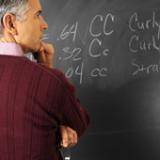When attempting to help students in math, don’t forget the human factor.
That appears to be the central conclusion of an article I came across recently, which came out this fall in the Review of Educational Research, a publication of the American Educational Research Association. Published in September (I just noticed it a few days ago), the study is a research review of 87 experimental studies of the effectiveness of elementary math programs.
You can read it here.

The basic conclusion: Changing teaching practices does more to increase students’ math achievement than simply changing textbooks or using computers in instruction.The article is a review of published studies of those three approaches, which had to meet fairly select research standards to be considered.
The authors of the article, Robert Slavin and Cynthia Lake, found that there was limited evidence that particular math textbooks had an effect on student achievement, according to the criteria used in their study. The effects of computer-assisted instruction were moderate, they found. But the strongest positive effects came as a result of changes to instructional approaches, such as the use of “cooperative learning":—having students work in small pairs or small groups#151;efforts to improve teachers’ skills in classroom management and how they use their time, and supplemental tutoring programs for students.
The authors point out that changing math students’ computers usage, textbook instruction, and focusing on teachers’ practices “do not conflict with each other” and in fact could compliment each other to improve student achievement.
Yet the findings “suggest that educators and researchers might do well to focus more on how mathematics is taught, rather than expecting that choosing one or another textbook by itself will move their students forward,” they say.
Slavin and Lake are both associated with Johns Hopkins University and its Center for Research and Reform . Their review should provide some fodder for discussion, given the heated debates over math curricula and textbooks that periodically break out across the country, particularly during textbook-approval process. Here’s an example of a recent conflagration.
Research has pointed to the primacy of effective teachers in math before, as noted by the National Math Panel’s report last year. What’s less clear is what kind of background and preparation makes for a good math teacher.
In light of those debates, I suppose the upshot of their review might be, well, what if math curricula and textbooks don’t matter quite as much as everybody says they do? Of course, a lot of teachers and math experts would probably say that curricula, textbooks, and teaching are all intertwined. Unfortunately, teachers with shaky math skills rely heavily on their textbooks to guide them. And the textbooks are typically based on individual states’ standards and curricula. So if the curricula and textbooks are incoherent, or simply of poor quality, that just makes the teacher’s job all the more difficult.
